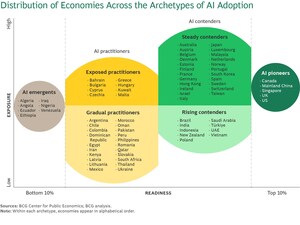BOSTON, March 21, 2019 /PRNewswire/ -- For the first time, there's a shakeup at the top of BCG's annual list of the most innovative companies. In this year's global survey of more than 2,500 senior innovation leaders, longtime leader Apple ranks third, and Google (or its parent company, Alphabet) and Amazon move up to first and second place, respectively. Microsoft and Samsung round out the top five.
Although tech companies hold nine of the top ten places, traditional industries are account for more than half of the top 50 list. Adidas (#10), Boeing (#11), BASF (#12), Johnson & Johnson (#14), and DowDuPont (#15) rank in the top 15. T-Mobile (#13), DowDuPont, Vale (#19), Stryker (#35), and Rio Tinto (#49) join the list for the first time.
The rising importance of digital technology continues to be an overarching megatrend for innovators. In particular, BCG's new report, The Most Innovative Companies 2019: The Rise of AI, Platforms, and Ecosystems, finds that innovators are increasingly embracing AI as a way to develop new products and services and improve internal innovation. In addition, innovators are embracing technology platforms and their cousin, ecosystems, to tap into sources of external innovation and differentiation.
"Digital technology and external innovation have become watchwords," said Ramón Baeza, a BCG senior partner and report coauthor. "All of the top ten companies—and many in the top 50—use AI, platforms, and ecosystems to enable themselves and others to pursue new products, services, and ways of working."
AI Gains Traction
Among survey respondents, 90% reported that their companies are investing in AI. More than 30% expect AI to be among the innovation areas with the highest impact on their businesses in the next three to five years. Almost 30% are actively targeting AI in their innovation programs.
A skills gap is evident with respect to AI. More than 65% of self-described strong innovators rate themselves as above average on AI, versus just 2% of weak innovators. Just under 20% of all respondents see their organizations as both strong innovators and above average on AI (a group the report calls AI leaders). Among AI leaders, 94% see AI as important to their organizations' future growth, versus 56% of AI laggards (respondents who rate their organization's AI capabilities as below average).
"AI will have a significant impact on business processes, but its biggest potential lies in developing new products and services that can yield major revenue streams over time," said Michael Ringel, a BCG senior partner and report coauthor. "AI leaders are already blazing a trail," he said, noting that leaders reported much higher percentages of sales driven by AI-enhanced products or services introduced in the past three years.
Among AI leaders, 46% say AI-enhanced products and services represented 16% or more of sales, versus 10% for laggards. And AI leaders and laggards see AI playing a larger role in the future, with 54% of leaders and 22% of laggards expecting more than 16% of sales to come from AI-enhanced products and services in the next five years.
Strong Innovators Access Outside Resources
Rising use of AI is one factor driving increased interest in platforms and ecosystems. AI leaders say they are more likely to use external vendors for AI projects, with 36% relying entirely on external vendors and another 48% using mostly external services or a mix or internal and outside capabilities. This approach may be helping leaders climb the AI curve quickly, since expertise is still in short supply.
This year's report shows organizations increasingly looking beyond their own walls for new ideas. Partnership models are on the rise: from 2015 to 2018, more strong innovators are using incubators (rising from 59% to 75%), academic partnerships (rising from 60% to 81%), and company partnerships (rising from 65% to 83%).
"Digital technologies enable collaboration platforms, and collaboration platforms enable ecosystems that bring together a group of organizations to build a new capability or product or service offering, or to push forward a new field of science or technology," said Florian Grassl, a BCG partner and report coauthor. "Not all ecosystems are alike, however. They have different types of glue that bind their participants. Money is one type, of course, but knowledge, data, skills, and community can be equally important."
Some ecosystems are expansions of traditional ways of organizing and doing business. They tend to have an orchestrator at the center, with which all the other participants interact, and established hierarchies and structures. Other ecosystems, including many of those that are involved in the early research phase of research and development, tend to be more dynamic. They rely less on a central orchestrator and more on multifaceted interactions among participants.
BCG has surveyed senior innovation executives—across a wide range of countries and industries—13 times since 2004 to cast light on the state of innovation in business. A copy of the firm's latest report can be downloaded here.
To arrange an interview with one of the authors, please contact Eric Gregoire at +1 617 850 3783 or [email protected].
About Boston Consulting Group
Boston Consulting Group (BCG) is a global management consulting firm and the world's leading advisor on business strategy. We partner with clients from the private, public, and not-for-profit sectors in all regions to identify their highest-value opportunities, address their most critical challenges, and transform their enterprises. Our customized approach combines deep insight into the dynamics of companies and markets with close collaboration at all levels of the client organization. This ensures that our clients achieve sustainable competitive advantage, build more capable organizations, and secure lasting results. Founded in 1963, BCG is a private company with offices in more than 90 cities in 50 countries. For more information, please visit bcg.com.
SOURCE Boston Consulting Group (BCG)
Related Links
WANT YOUR COMPANY'S NEWS FEATURED ON PRNEWSWIRE.COM?
Newsrooms &
Influencers
Digital Media
Outlets
Journalists
Opted In





Share this article